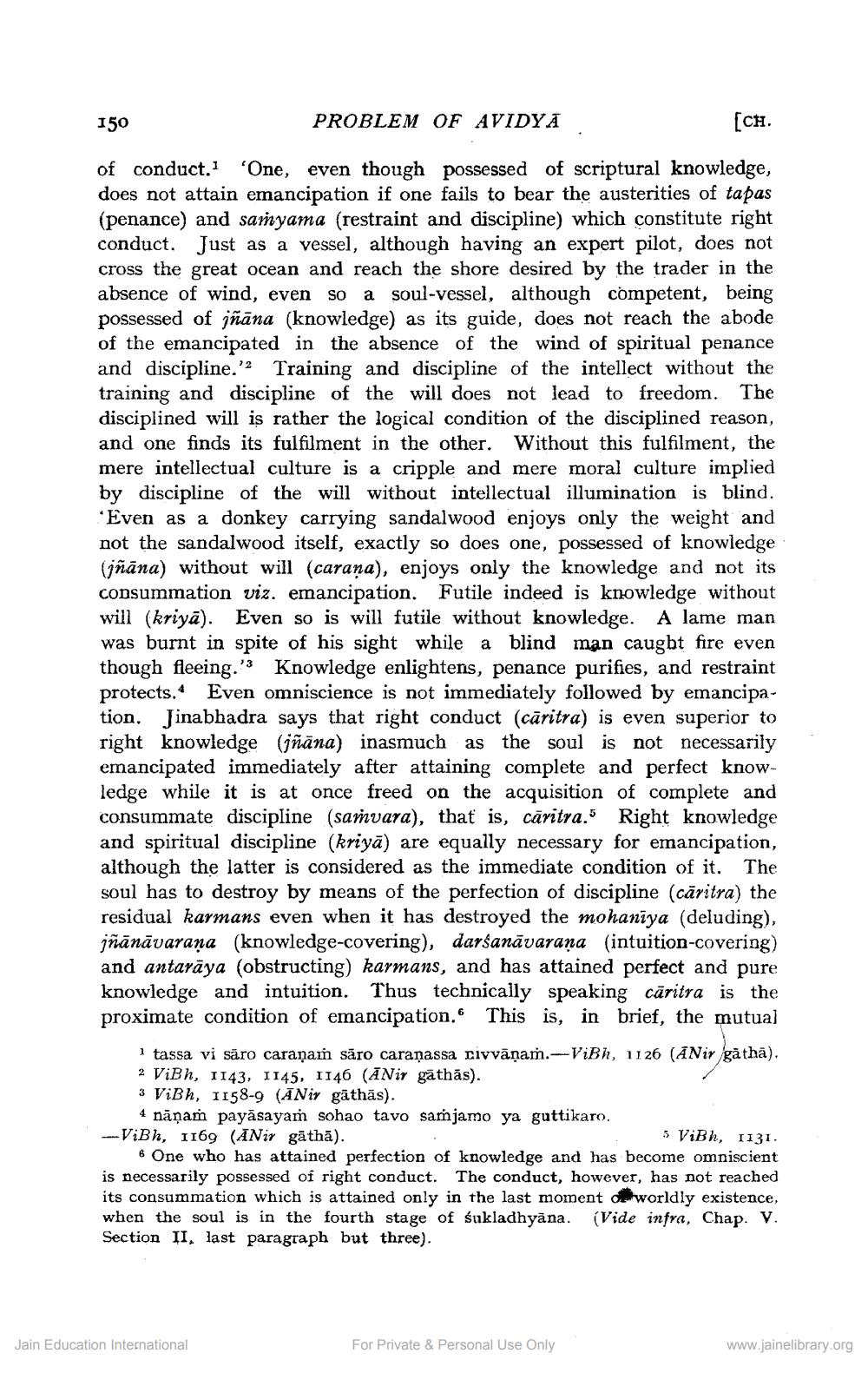________________
150
PROBLEM OF AVIDYA
of conduct.1 'One, even though possessed of scriptural knowledge, does not attain emancipation if one fails to bear the austerities of tapas (penance) and samyama (restraint and discipline) which constitute right conduct. Just as a vessel, although having an expert pilot, does not cross the great ocean and reach the shore desired by the trader in the absence of wind, even so a soul-vessel, although competent, being possessed of jñāna (knowledge) as its guide, does not reach the abode of the emancipated in the absence of the wind of spiritual penance and discipline.'2 Training and discipline of the intellect without the training and discipline of the will does not lead to freedom. The disciplined will is rather the logical condition of the disciplined reason, and one finds its fulfilment in the other. Without this fulfilment, the mere intellectual culture is a cripple and mere moral culture implied by discipline of the will without intellectual illumination is blind. Even as a donkey carrying sandalwood enjoys only the weight and not the sandalwood itself, exactly so does one, possessed of knowledge (jñāna) without will (carana), enjoys only the knowledge and not its consummation viz. emancipation. Futile indeed is knowledge without will (kriyā). Even so is will futile without knowledge. A lame man was burnt in spite of his sight while a blind man caught fire even though fleeing.'s Knowledge enlightens, penance purifies, and restraint protects. Even omniscience is not immediately followed by emancipation. Jinabhadra says that right conduct (caritra) is even superior to right knowledge (jñāna) inasmuch as the soul is not necessarily emancipated immediately after attaining complete and perfect knowledge while it is at once freed on the acquisition of complete and consummate discipline (samvara), that is, caritra. Right knowledge and spiritual discipline (kriyā) are equally necessary for emancipation, although the latter is considered as the immediate condition of it. The soul has to destroy by means of the perfection of discipline (căritra) the residual karmans even when it has destroyed the mohaniya (deluding), jñānāvarana (knowledge-covering), darśanavaraṇa (intuition-covering) and antaraya (obstructing) karmans, and has attained perfect and pure knowledge and intuition. Thus technically speaking caritra is the proximate condition of emancipation. This is, in brief, the mutual
[CH.
1 tassa vi sāro caraṇam sāro caraṇassa nivvāṇam.-ViBh, 1126 (ANir gāthā).
2 ViBh, 1143, 1145, 1146 (ANir gāthās).
3 ViBh, 1158-9 (ANir gāthās).
Jain Education International
4 nāņaṁ payāsayam sohao tavo samjamo ya guttikaro.
5 ViBh, 1131.
-ViBh, 1169 (ANir gāthā).
One who has attained perfection of knowledge and has become omniscient is necessarily possessed of right conduct. The conduct, however, has not reached its consummation which is attained only in the last moment of worldly existence, when the soul is in the fourth stage of sukladhyāna. (Vide infra, Chap. V. Section II, last paragraph but three).
For Private & Personal Use Only
www.jainelibrary.org




